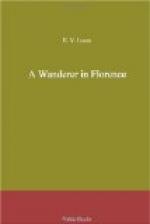Cosimo died in 1464, leaving an invalid son, Piero, aged forty-eight, known for his almost continuous gout as Il Gottoso. Giovanni and Cosimo had had to work for their power; Piero stepped naturally into it, although almost immediately he had to deal with a plot—the first for thirty years—to ruin the Medici prestige, the leader of which was that Luca Pitti who began the Pitti palace in order to have a better house than the Medici. The plot failed, not a little owing to young Lorenzo de’ Medici’s address, and the remaining few years of Piero’s life were tranquil. He was a quiet, kindly man with the traditional family love of the arts, and it was for him that Gozzoli worked. He died in 1469, leaving two sons, Lorenzo (1449-1492) and Giuliano (1453-1478).
Lorenzo had been brought up as the future leading citizen of Florence: he had every advantage of education and environment, and was rich in the aristocratic spirit which often blossoms most richly in the second or third generation of wealthy business families. Giovanni had been a banker before everything, Cosimo an administrator, Piero a faithful inheritor of his father’s wishes; it was left for Lorenzo to be the first poet and natural prince of the Medici blood. Lorenzo continued to bank but mismanaged the work and lost heavily; while his poetical tendencies no doubt distracted his attention generally from affairs. Yet such was his sympathetic understanding and his native splendour and gift of leadership that he could not but be at the head of everything, the first to be consulted and ingratiated. Not only was he the first Medici poet but the first of the family to marry not for love but for policy, and that too was a sign of decadence.
Lorenzo came into power when only twenty, and at the age of forty-two he was dead, but in the interval, by his interest in every kind of intellectual and artistic activity, by his passion for the greatness and glory of Florence, he made for himself a name that must always connote liberality, splendour, and enlightenment. But it is beyond question that under Lorenzo the Florentines changed deeply and for the worse. The old thrift and simplicity gave way to extravagance and ostentation; the old faith gave way too, but that was not wholly the effect of Lorenzo’s natural inclination towards Platonic philosophy, fostered by his tutor Marsilio Ficino and his friends Poliziano and Pico della Mirandola, but was due in no small measure also to the hostility of Pope Sixtus, which culminated in the Pazzi Conspiracy of 1478 and the murder of Giuliano. Looking at the history of Florence from our present vantage-point we can see that although under Lorenzo the Magnificent she was the centre of the world’s culture and distinction, there was behind this dazzling front no seriousness of purpose. She was in short enjoying the fruits of her labours as though the time of rest had come; and this when strenuousness was more than ever important. Lorenzo carried on every good work of his father and grandfather (he spent L65,000 a year in books alone) and was as jealous of Florentine interests; but he was also “The Magnificent,” and in that lay the peril. Florence could do with wealth and power, but magnificence went to her head.




